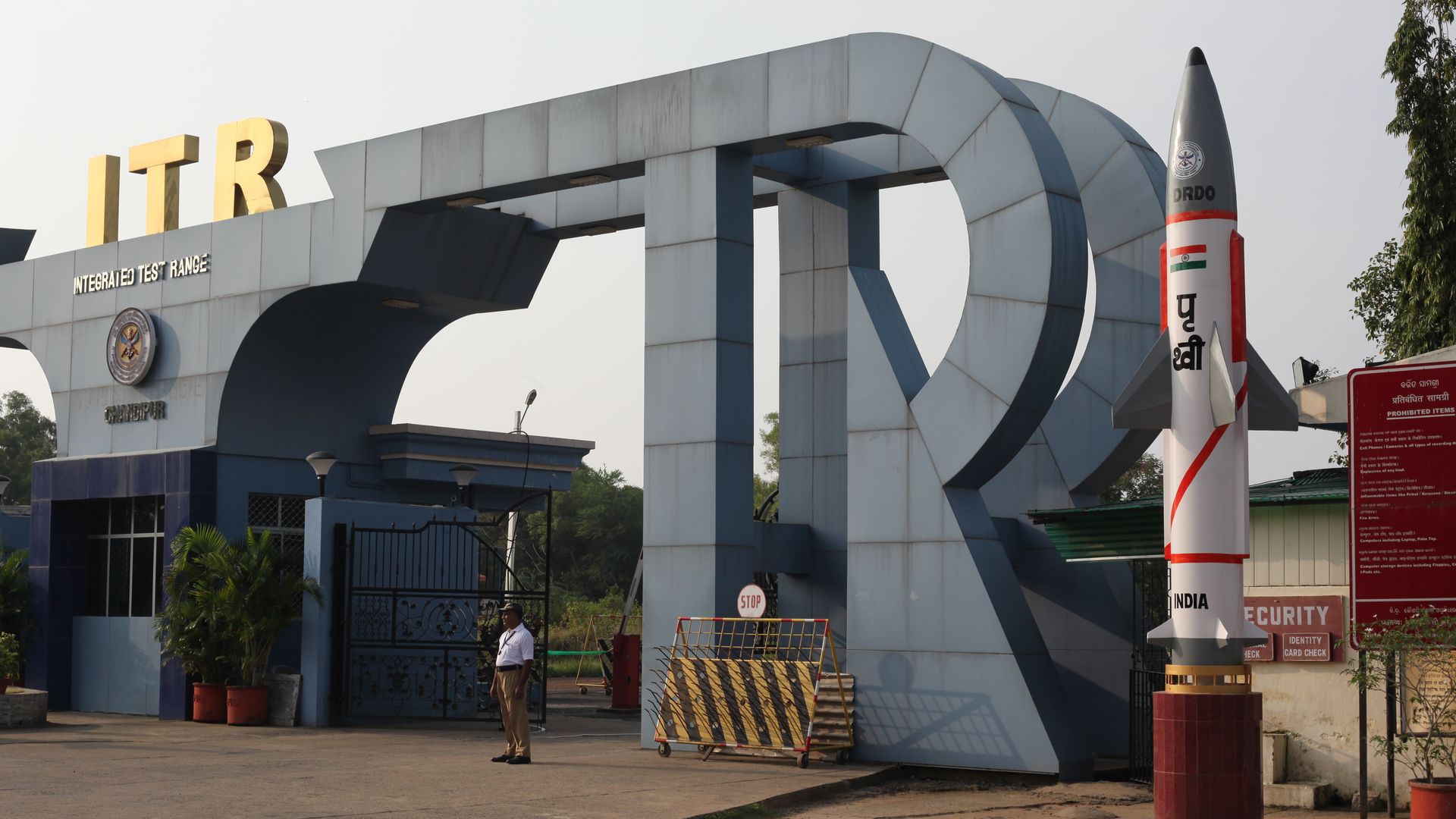 North Korea isn't the world's only nuclear weapons crisis - Axios
North Korea isn't the world's only nuclear weapons crisis - Axios
An entrance to one of India's missile test ranges. Photo: Pallava Bagla/Corbis via Getty Images
For all the attention North Korea is getting, there’s a web of nuclear threats around the world that risk setting off an arms race all on their own — even if the North Korean threat goes away.
The big picture: It’s worth taking the time to focus on the other standoffs. Heightened risk is not a certainty that nuclear conflict breaks out, but the web is tangled enough that a spark of conflict could have wide-ranging global consequences.
Iran
Iran began increasing its uranium enrichment following the U.S. withdrawal from the nuclear deal, and it may not remain in the deal with other countries much longer. Most of the incentive to remain in the deal came from economic benefits of doing business with the United States — and Europe alone will have trouble enticing Iran to stay in the deal.
Saudi Arabia
The Saudis have said they would consider making nuclear weapons if Iran restarts its nuclear weapons program. And Saudi Arabia has been seeking U.S. help in starting a nuclear program, even though Riyadh hasn’t accepted terms of uranium enrichment that would prevent the program from escalating beyond peaceful aims. Israel has gotten involved in the conversation in an attempt to prevent a potential arms race in the region.
China
Its nuclear policy states that it would only use nuclear weapons in response to an attack — but analysts close to the Chinese government fear that the U.S. National Security Strategy and Nuclear Posture Review frame China as a potential target for the U.S. as a primary rival on the world stage. And China has been working to catch up to the U.S. in the meantime.
India, Israel, and Pakistan
These three countries never signed the nuclear Nonproliferation Treaty (NPT), which was drawn up as a way to stop the spread of nuclear weapons. And they each have nuclear arsenals.
- Pakistan and India’s nuclear tension and arms race goes all the way back to the signing of the NPT in 1968‚ and their rivalry goes back even farther, to the partition of British India in 1947. According to the Brookings Institution, the cascade of geopolitical influence is dizzying in this case, too: Pakistan responds to India’s moves in the nuclear realm, and India responds to both Pakistan and China. And China in turn, responds to India and the U.S. This circle of tension has kept the region nearly on the brink of nuclear conflict since the 1960s.
- Israel has maintained its nuclear weapons arsenal to keep up with the possibility that Saudi Arabia and Iran could become nuclear states, although it has kept a “strategic ambiguity” about it, neither confirming nor denying its existence. It’s believed that Israel began its program in the 1950s and that its weapons can reach Libya, Iran, and Russia, creating potential flash points there.
A few other powers…
- Russia has a nuclear stockpile, too, and it’s the largest in the world. However, Russia, like China, is still working to catch up to the U.S. in terms of nuclear capability.
- France's nuclear arsenal relies on the nuclear deterrence doctrine as a way to assert its sovereignty.
- The U.K. is viewed as adept at building a nuclear weapons state while using a minimal deterrent — although it does not rule out using nuclear weapons in a first strike, per the Nuclear Threat Initiative.
Countries that had nuclear weapons/programs
- Libya gave up its nuclear weapons in 2003. Many analysts believe Libya’s experience giving up nuclear weapons and Muammar Gadhafi’s downfall following the abandonment is scaring North Korea’s Kim Jong-un away from denuclearization.
- Belarus, Kazakhstan, and Ukraine had nuclear weapons at one time following the collapse of the Soviet Union, but returned them to Russia.
- Argentina, Brazil, South Korea, and Taiwan all also abandoned nuclear weapons programs.
- South Africa developed nuclear warheads but dismantled them before joining the NPT in the 1990s.
- Iraq dismantled its nuclear weapons program for UN inspectors after the Persian Gulf War.
No comments:
Post a Comment